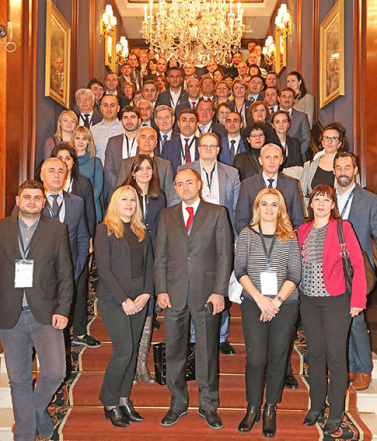
A two-day workshop in Vienna on November 28-29 has brought together participants from three regional programmes – STAREP, EU-REPARIS, and PULSAR – which support enhanced financial reporting practices in the private and public sectors in the EU-Eastern Partnership countries and the Western Balkans.
STAREP is an EU4Business programme on Strengthening Auditing and Reporting in the Eastern Partnership.
The main objective of the workshop was to discuss the impact of the Fourth Industrial Revolution on the accountancy profession, which is bringing rapid changes in all spheres through the use of artificial intelligence, robotics, data science, and other digital technologies. The workshop also discussed the significant challenges faced by the accounting profession considering continued financial reporting failures such as those at Tesco, Carillion and Petrobas, among others.
The first day of the workshop was a joint day for communities of practice dealing with financial reporting in both public and corporate sectors, with experiences shared between jurisdictions that face similar challenges in implementing public and corporate reporting reforms.
The presentations and discussions on how technology is impacting business, public and corporate financial reporting, and stakeholder relationships were welcomed by participants. The session explored the benefits, as well as the risks, that the adoption of new technologies can bring to the profession. There was a consensus among participants that there is a need to re-think and adapt corporate financial reporting and auditing practices to new digital challenges and opportunities, especially the use of artificial intelligence and block chain technology.
The panel on changing the role of the accounting profession provided participants with various perspectives on the ways the profession is evolving to deal with challenges ahead and prepare for the future.
Private- and public-sector examples of corporate and public financial reporting failures were reviewed during the workshop and the possible implications in terms of financial reporting and audit oversight were discussed by the participants.
The participants also worked together on a case study, a real-life example of a state-owned enterprise, and analysed the aspects of governance, including financial monitoring, corporate governance arrangements, internal controls, accountability, transparency, and fiscal risk management.
During the second day of the workshop, participants from the STAREP and EU-REPARIS regional programmes had the opportunity to learn about the experience related to the delegation of certain functions and responsibilities by public oversight bodies to professional accountancy organisations (PAOs), and about the UK Financial Reporting Council’s experience on how to develop a quality assurance system.
Finally, the workshop presented a new accounting and auditing reform results framework measuring progress made in countries participating in the STAREP programme and offered an opportunity for participants of both STAREP and EU-REPARIS programmes to review the benefits of having a results framework, highlighting key outcomes achieved with the support of the World Bank’s Centre for Financial Reporting Reform (CFRR) between 2013 and 2018.
While many STAREP countries achieved impressive progress by adopting new legislation in the field of accounting and auditing, implementing these laws in practice, and the necessary capacity, will be the next challenge.
The EU4Business STAREP programme (Strengthening Auditing and Reporting in the Eastern Partnership) is an EU-funded regional programme implemented by the World Bank’s Centre for Financial Reporting Reform (CFRR) for Armenia, Azerbaijan, Belarus, Georgia, the Republic of Moldova and Ukraine. STAREP helps participating countries to modernise corporate financial reporting frameworks and raise the capacity of local institutions to implement these frameworks effectively.




